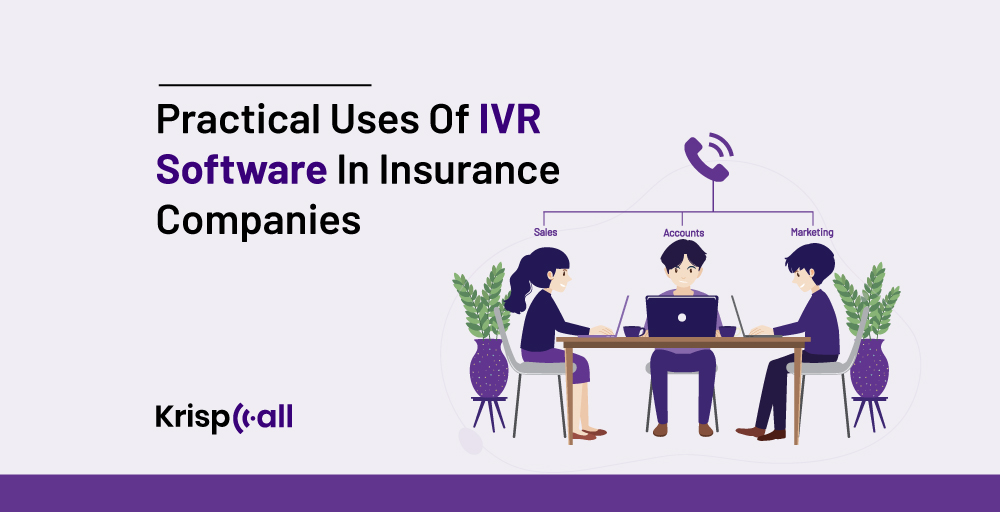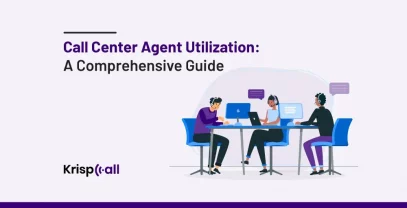Have you ever been frustrated with handling a bulk of customer inquiries in your insurance companies? Answering tons of calls and basic queries such as insurance policies can be tedious and time-consuming.
No worries 🤩 with IVR software, you can handle a huge volume of inbound calls 📞 or queries in an efficient way, as it provides predefined answers for FAQs such as basic information like policy details, insurance coverage, and renewal date.
Here in this blog will learn about IVR services, practical uses of IVR software in insurance companies and how it can be beneficial to your company.
Also, you will get to know IVR’s various features, such as efficient call-routing, customizable service, fraud detection ⚠️, enhanced customer feedback, automated SMS ✉️ and scheduled appointments 🗓️.
🔑 KEY HIGHLIGHTS
- IVR software stands for Interactive Voice Response Software, which allows customers to contact businesses through pre-recorded voice messages or keypad input.
- IVR systems are important for insurance companies because of the benefits like efficient call handling, 24/7 availability, customized service, appointment scheduling & reminders, and more.
- IVR best practices include using effective call routing, providing instant policy information, and simplifying insurance payments.
- The call routing features of IVR can manage almost all the traffic of inbound calls to particular agents for a better human support experience.
What Is IVR Software
IVR software is a telephony technology that allows businesses to interact with customers through pre-recorded voice messages or keypad input using IVR service. It uses voice commands or keypad input to interact with callers.
This software works as a virtual agent that provides advanced features like voice recognition, call routing to particular agents, and integration with CRM systems and databases. The call routing features of IVR manage all the traffic of inbound calls to particular agents for a better human support experience.
With the advancement of cloud-based telephony systems, IVR software optimizes its features to the optimum level to provide top-notch service for business. Cloud-based IVR solutions offer more flexibility for customization and configuration, unparalleled scalability to adapt to any business volume, integration with third-party services, and cost-effectiveness by reducing on-premise hardware and maintenance costs.
Why Are IVR Systems Important Insurance Companies
Interactive voice response systems are important for insurance companies as they provide efficient call-routing capabilities that lead callers to basic information like policy details, renewal dates, and automated SMS features.
IVR systems can also perform complex actions like scheduling appointments at any time, day or night, and making recommendations for further plans based on their previous behavior.
Here are some reasons that explain the importance of IVR systems in Insurance companies.
1. Efficient Call Handling
Call centers in insurance companies may get a large volume of calls. Performing manual tasks to solve all of their queries seems tedious and time-consuming. IVR Solutions provides advanced call handling features for all inbound calls.
IVR software provides advanced cloud telephony features like call transfer to the right agents, voice command, or keypad input through pre-defined redirection to specific features. IVR cleverly routes your calls to a particular agent based on traffic and their availability.
2. 24/7 Availability
Business insurance companies must offer their service 24/7 because customers may need basic information at any time. IVR service can be performed at any time so that any customer minor query can be resolved. They may want basic details like answers to basic queries or directions to knowledge bases.
3. Cost-Effective Customer Service
IVR solution provides better customer service for your insurance in a cost-effective way. A large volume of routine queries can be solved without real agents as they provide predefined answers to frequently asked questions. Customers can enquire about their basic information independently without the need for any agents. Reducing the number of agents will definitely minimize the costs.
Using an IVR solution, customers can get customized service. It can personalize service for existing users, like ‘Welcoming’, when they use the service with custom greetings. It recognizes and greets people by their customer ID number and name. Sophisticated IVR service can analyze your keypad enter or spoken words. They provide routing features based on your voice command.
Custom IVR service proactively guides you and provides dynamic responses based on your needs. For example, if you mention renewing your car insurance, it will direct you to the renewal form of car insurance or the FAQ related to renewal, and it also prompts you with the renewal process if your insurance coverage is about to expire.
5. Data Collection And Analysis
One of the most powerful tools of IVR solutions is that it analyzes and tracks all data for future pre-preference. It stores various data, such as call volumes, durations, and customer feedback, for a better IVR experience. Analyzing previous patterns, keywords, and keypad inputs can identify the caller’s intent and needs.
Also, by analyzing gathered call data, the company can identify particular areas for improvement in the IVR systems’ prompts, menu, or any self-service options. Data analysis can be helpful in identifying customer’s common needs and inquiries.
6. Appointment Scheduling and Reminders
Scheduling appointments and delivering reminders with IVR can be performed 24/7 through automation. IVR can streamline scheduling and send automated reminders to policyholders. Customers can get a basic query on schedule, like date, availability, and time slots, with particular agents at any time.
The IVR handles the initial steps of the automated appointment scheduling process, which helps to reduce agents’ workloads so that they can be more focused on complex interactions rather than simple ones. After the schedule fix, IVR can automatically send confirmation text with appointment details like date, time, agent name, and location.
7 Best Practical Uses Of IVR Software In Insurance Companies
IVR software can act as a 24/7 assistant for both the company and customers. It can be used to solve simple queries and complex automation tasks.
Here are the 7 best practical uses of IVR software in Insurance Companies:
1. Effective IVR Call Routing
IVR call routing efficiently manages all your inbound traffic. Imagine your insurance company receiving a huge volume of queries. Your job is to resolve those queries with a better user experience.
IVR call routing comes in handy in this scenario as it provides predefined answers for frequently asked questions, including policy details, insurance coverage, and renewal date. IVR routes customer calls to particular agents for better reach. It manages all that traffic either with automated pre-defined answers through user input or directing calls to specific agents.
2. Simplifying Insurance Payments
Dealing with insurance payments can be a frustrating task as it involves many payment options, confirmation, banking issues, and agents’ availability. IVR solutions simplify insurance payments as they ease your payment, providing different benefits and options to make your insurance payments.
You can make your payment any time, day or night, as they provide their service 24/7. They provide ease and quick payment through the menu that can be navigated through your phone keypad. Offering various payment options, confirming your payment, and reminding you of your payment due will surely ease your payment process.
3. Instant Policy Information
With the use of effective IVR, you can get basic information about your policy, including the date, renewal date, and policy coverage, and reach particular agents for inquiries. IVR’s advanced features, data collection, and analysis provide better recommendations for your policy plan updates.
It analyzes the customer’s previous data and behavior that can be utilized to tone the system to meet their updated needs, leading to improved customer service experience.
4. Automated SMS Alerts
Providing updates to your service or plan through automated SMS alerts. IVR provides SMS automation features for your insurance business. With the Automation features, you can send messages to your customers every time they purchase your new plan.
Providing frequent updates through automation messages like new features, reminders of appointment schedules, updation on policy, notices, and renewal dates.
5. Fraud Detection
Fighting fraud is crucial for insurance companies. IVR service provides advanced voice authorization that analyzes the caller’s voice pattern, including tone, pitch, and cadence, and compares it to the previous. They offer different fraud detection techniques, such as multi-factor authentication involving sending pins through messages or asking simple security questions, analyzing the activity of the user, including their interactions with unauthorized requests, to detect suspicious and limited access and control.
6. Enhanced Customer Feedback
Enhancing customer feedback leads to a positive customer experience. Customer feedback can be enhanced through analyzing customers’ stored data. You can use sophisticated IVR systems to perform in-call call center campaign surveys to get to know more about customers.
IVR systems can also record all routed calls. These recordings, in turn, can also be used with speech analytics software to view their sentiments towards our insurance service, which will surely help to enhance customer experience.
7. Appointment Scheduling And Reminders
IVR provides an appointment scheduling service to the customer 24/7. Customers can book their appointment any time, day or night, for their insurance service. Automation scheduling helps to reduce the agent’s workloads so that they can be more focused on complex interactions.
After the scheduled fix, IVR can automatically send a confirmation text with appointment details like date, time, agent name, and location and remind their policyholder of each update, notice, and offer.
Conclusion
IVR service can be used to perform simple tasks like navigating insurance services through the menu using a mobile keypad to advanced customer data analysis to deliver a better experience.
IVR provides efficient call routing features 24/7 in a cost-affordable way. It also reduces agents’ workloads in handling a high volume of calls.
With KrispCall’s IVR system, you can optimize your insurance company’s call routing as it provides many advanced call-handling features. KrispCall’s IVR system uses keypad and voice commands to guide callers to specific information and the right agents. Customers can easily get basic information like policy details, date, time of renewal, and frequent updates of features through automated messages with it.
The future of IVR services in the insurance sector is bright as it offers various opportunities to enhance customer experience with efficiency and streamline processes. We can expect to see IVR use machine learning and Advanced AI to assist your customer queries based on their past interaction and behavior.
FAQs
What does IVR stand for in insurance?
IVR stands for Interactive Voice Response in insurance, which allows insurance companies to interact with customers through pre-recorded voice messages or keypad input.
What are the benefits of IVR insurance?
IVR insurance provides basic information, such as details of their policy, insurance coverage, and renewal date, to recommend further plans based on previous behavior.
What is the purpose of the IVR?
The purpose of IVR is to handle huge volumes of calls in an efficient way with a better user experience. IVR service is available 24/7.
What does IVRS stand for?
IVRS stands for Interactive Voice Response System, which is an automated telephony system that interacts with callers, gather their information and routes their call to particular agents.





